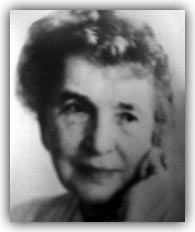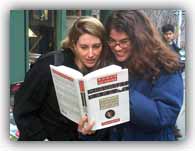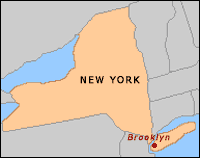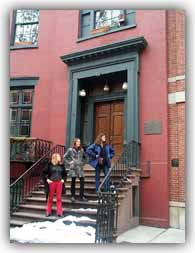 |





Margaret Sanger Biography
Gloria Steinem writes about Sanger
|
 |

Making an Impact

Throughout history many different movements have contributed to changes in society; changes that still affect us on a daily basis. The luxuries we have didn't automatically drop right in our lap. People suffered, organized, lobbied spoke out and fought for the rights we have in today's society. We tend to overlook their contributions because we get in the routine of our own lives and our own struggles. So whether you're struggling right now or just too busy, I want you to just take a moment to read about the struggle of a movement and a person that has affected us and will continue to effect us for a long, long time.
One woman who is still making an impact is Margaret Sanger. Margaret Sanger was the leader of the birth control movement. She fought for the rights of women to use their bodies at their own discretion. I think people in this country don't realize how she has impacted our lives. She fought for birth control at a time when women were told to keep quiet, stay home and take care of the children. She was a woman of many talents and she would not keep quiet. She fought for access to birth control not only in the United States, but all over the world.

|
 |
Sanger was born on September 14th, 1879 in Corning, New York. When she was growing up she witnessed her mom's slow death. Worn out after 18 pregnancies and 11 live births, her mom couldn't physically handle life any more. After this, Sanger worked as a practical nurse and a midwife in some of the poorest parts of New York City in the years before the First World War. She saw women deprived of their health and sexuality and children deprived of adequate care. Contraceptive information was so suppressed that it was even illegal to send it though the mail. Women weren't allowed to use birth control of any kind. So if you were going to have sex, you were at a huge risk of becoming pregnant.
Women wanted birth control for many different reasons. They wouldn't have to worry about a baby every time they had sex. They could enjoy sex more, and it would give them a certain amount of freedom that had been restricted up to this point. But they were denied this right. By law, women couldn't use birth control because it wasn't natural. As if it was natural to be pregnant 18 times like Margaret's mother. Noticing and learning about the injustices that were happening to women all around her, Sanger began to cultivate very strong views on the contraceptive situation. She felt that women should have the right to access any and every kind of birth control that there was. Not only should they have the right to use it, but also the men should pay for it and it should even be included when you see the doctor.
|

Dogs, Dogs and Even more Dogs!
|
These ideas were very radical for the time. People thought she was ridiculous and outrageous for thinking like this. Knowing what society thought of these ideas, many women were scared to support or even be a part of discussions on birth control. But the more and more Sanger talked about it the more and more her thoughts became clear. People started agreeing with her and having meetings about how they were going to change what was happening to women.

|
 |
While living in New York Margaret was quickly recruited to be on the women's committee for the Socialist Party. They noticed her strong leadership skills and clear ideas and thoughts. She became a very active organizer and reporter for the Socialist Party. In 1914 she launched "Women Rebel", a feminist monthly magazine that advocated birth control. She also distributed pamphlets containing various different contraceptive methods, including the condom and the sponge. This pamphlet entitled "Family Limitation" caused outrage throughout the community. It caused outrage on the governmental level and in the religious community. The Roman Catholic Church, Sanger's biggest and most powerful critic, was an active opponent of what she was doing. They called her an "evil villain who's promoting the downfall of society".
 |
Sanger continued to spread the word of Birth Control constantly. She opened the first family planning clinic in the U.S. It was in the Brownsville part of Brooklyn, New York. One day in 1917 while distributing different kinds of birth control to immigrants Sanger was arrested for distribution of illegal contraceptives. Those charges were dropped and then she was charged with delivering illegal contraceptives through the mail, which was a felony at the time. Sanger fled to Europe to escape the charges. She eventually went to jail for thirty days when she retuned from Europe. The short time that Sanger spent in jail didn't slow her down a bit. Through the next year she perfected her tactics of direct action, agitation, publicity and education to bring birth control out of the "gutter". She made it a main issue on every political party's platform.

|
 |
Sanger realized she must begin lobbying for Birth control as well as keep doing direct action. In 1921 she founded the American Birth Control League (changed to Planned Parenthood in 1941), a lobbying group aimed at securing medical acceptance of birth control on public health grounds and the vehicle for attracting middle and upper class support. Then, in 1923, she established the Clinical Research Bureau as a prototype of the nationwide chain of doctor staffed clinics that opened in the interwar years.

|
 |
Through these organizations Sanger wanted to develop a nationwide reason for birth control besides just a woman's right to control her body. This was a negative turning point for the movement. She and the movement began to emphasize the public health and socio-economic benefits of birth control. In the process she associated herself, as well as the entire movement, with those promoting race betterment, the medicalization of birth control and prevailing notions of gender roles. Some of these associations have provoked attacks against Sanger in which she is labeled at worst a racist with ties to Hitler and at best insensitive and impudent. She believed in Eugenics, a philosophy that proposes that we should have more children from the fit and less from the unfit. She did, however, set up clinics all over the country and some overseas where people of all races and fitness would later benefit. It still doesn't make the words she said right.
Sanger had many critics, but she kept on fighting for women's rights to use birth control. In 1936 the case of United States v. One Package provided a milestone victory for birth control. It involved the ongoing trial of Dr. Hannah Stone, a close friend of Sanger's, who had ordered a shipment of Japanese pessaries. The shipment was held up at customs. The court ruled in Dr. Stone's favor. This established contraception as a recognized part of medical practice and removed the last legal barriers to the dissemination of contraceptive knowledge. That same year the American Medical Association announced their support and endorsement of birth control.
Sanger lived long enough to see her work bear fruit. The Birth Control Federation Of America changed its name to Planned Parenthood and became an organization that is in many different communities all over America to help people decide and get them prepared for bringing a child into this world. So remember whenever you see Planned Parenthoods around your town, that's the legacy of Margaret Sanger. She is also partially responsible for the variety of contraceptive choices at your local drugstore. Even up until the year before she died she was playing a role in the birth control movement. In 1965 she helped finance the first oral contraceptive, the pill. It was made legal the year before she died.
She died on September 6, 1966 in Tucson, Arizona leaving a life of struggle and success. The legacy of Sanger still lingers as you walk down the aisle at Wal-mart and see almost every birth control imaginable. Look around and read a little you will see how Margaret Sanger and birth control has affected all of our lives and will continue to.
Nick
Please email me at:
nick@ustrek.org
Links to Other Dispatches
Rebecca - Hooverized dresses? WWI in the first person
Stephen - Those crazy-sexy-cool sufferin' Suffragettes
Daphne - Women voters: You've come a long way, baby!
Steph - Celebrate the cycle of life!
Daphne - An "untouchable" tour of a former gangster's paradise
MAD - Domestic violence: Not behind closed doors anymore
|



